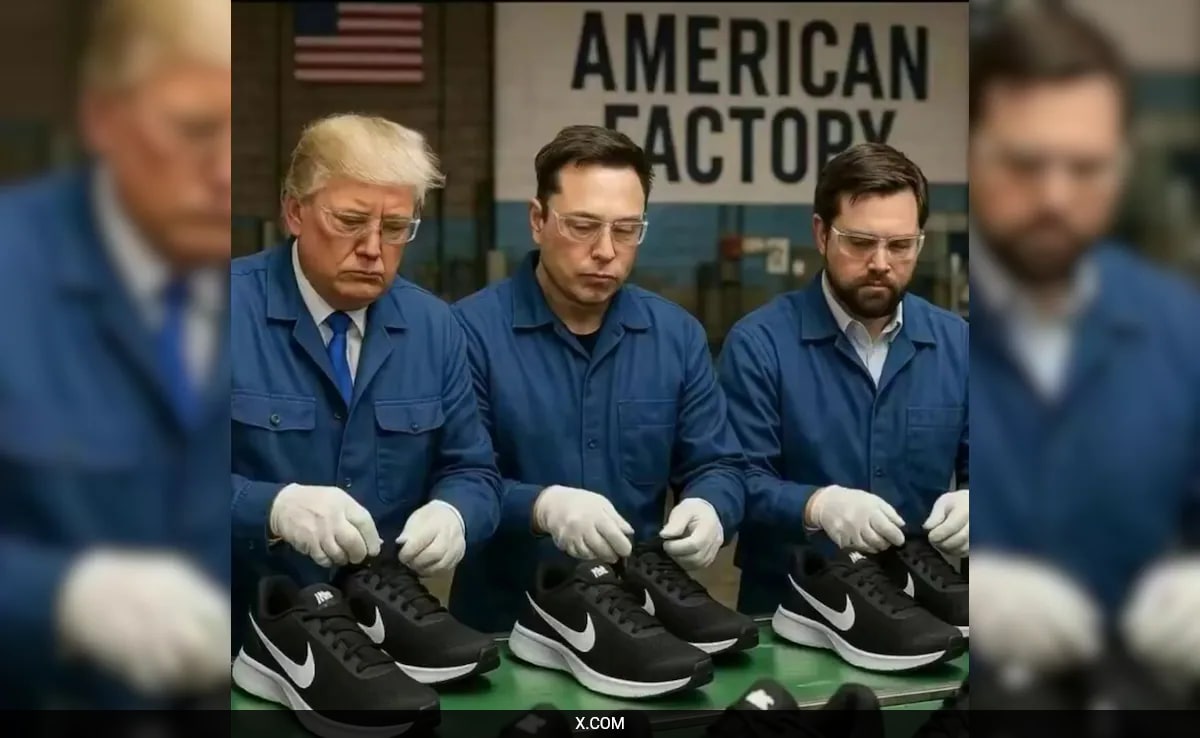AI-Generated Memes Showcase Trump and Musk in a Sneaker Factory

Reactions to Trump’s Tariff Policies in China
AI-Generated Memes and Videos
In response to President Donald Trump’s recent tariff measures, users on Chinese social media have been quick to create AI-generated memes and videos. These pieces of content humorously highlight the possible repercussions on American manufacturing. One particularly striking video features Trump alongside entrepreneur Elon Musk on a Nike sneaker production line. This scene raises concerns about the expected rise in manufacturing costs resulting from tariffs. Another video showcases Vice President JD Vance assembling an iPhone, further underlining fears of increased consumer prices.
Visual Representations
In the animated portrayals, Trump and Musk don matching blue jumpsuits as they work diligently on the Nike shoe production. Vice President JD Vance, clad in denim and a red hat lacking the traditional MAGA insignia, is seen piecing together an iPhone. Such visuals serve to mock the complexities and difficulties of American reindustrialization efforts.
Viral Content and Public Sentiment
These satirical creations have gained traction, accumulating millions of views across platforms like TikTok and X (formerly known as Twitter). The humor resonates widely, reflecting many people’s apprehensions about the effects of Trump’s "Make America Great Again" agenda and its associated trade policies. The videos illustrate potential price hikes for goods both produced domestically and those imported subject to newly imposed tariffs, which could reach an eye-popping 125%.
Official Criticism from China
Chinese government officials have not held back in their condemnation of the U.S. tariffs. Mao Ning, a spokeswoman for China’s Foreign Ministry, voiced her disagreement by stating, "We are Chinese. We are not afraid of provocations. We don’t back down." Her words, echoing through various media channels, showcase China’s firm stance against the perceived aggression of U.S. trade policies.
Additionally, China’s Commerce Minister Wang Wentao addressed the World Trade Organization (WTO), arguing that U.S. tariffs would have devastating impacts on developing nations. He warned that imposing "reciprocal tariffs" would particularly affect the least developed countries, potentially triggering humanitarian crises.
Concerns over Global Economic Impact
Wang further emphasized that the ongoing imposition of tariffs by the U.S. has introduced considerable uncertainty and instability into the global economy. Not only do these measures affect international trade, but the complications also seep into the domestic environment within the U.S., fostering chaos in various sectors.
In response to the rising tensions, China announced that its own 125% tariffs on U.S. goods would go into effect soon, bringing it almost in line with the colossal 145% levies placed by the U.S. on Chinese imports. This tit-for-tat strategy highlights the escalating nature of trade relations between the two nations.
Ignoring Further U.S. Levies
Despite the mounting tariffs, China has indicated that it would disregard any further levies introduced by President Trump. Officials in Beijing assert that it no longer makes economic sense for importers within China to purchase American goods. To protect its economic interests, China has also suggested the possibility of filing a lawsuit with the WTO against the recent tariff measures.
In summary, these developments illustrate the ongoing trade tensions between the U.S. and China, as well as the various methods through which both countries express their discontent. Chinese social media’s humorous approach to the situation stands in sharp contrast to the serious ramifications being discussed in official channels, highlighting a multifaceted view of international trade disputes.






